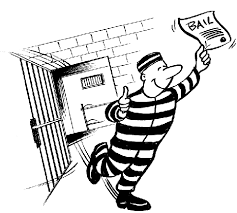bail
英 [beɪl]
美 [bel]
- n. 保释,保释人;保释金;杓
- vt. 保释,帮助某人脱离困境;往外舀水
- n. (Bail)人名;(英)贝尔;(法)巴伊
CET6+ TEM4 GRE
【记】音:保佑, 保哦,保护从困境中解脱出来,保释;
1. bail 保释 “贝尔被保释出来了”
bail 保释来自拉丁词bajulus, 持有者,责任者。来自旧时的一种法律规定,如须保释某人出去,须自己进监狱代替保释者作为承诺和责任。
- bail
- bail: There are now three distinct words bail in English, although they may all be related. Bail ‘money deposited as a guarantee when released’ [14] comes from Old French bail, a derivative of the verb baillier ‘take charge of, carry’, whose source was Latin bājulāre ‘carry’, from bājulus ‘carrier’. Bail ‘remove water’ [13], also spelled bale, probably comes ultimately from the same source; its immediate antecedent was Old French baille ‘bucket’, which perhaps went back to a hypothetical Vulgar Latin *bājula, a feminine form of bājulus.
The bail on top of cricket stumps [18] has been connected with Latin bājulus too – this could have been the source of Old French bail ‘cross-beam’ (‘loadcarrying beam’), which could quite plausibly have been applied to cricket bails; on the other hand it may go back to Old French bail, baille ‘enclosed court’ (source of English bailey [13]), which originally in English meant the ‘encircling walls of a castle’ but by the 19th century at the latest had developed the sense ‘bar for separating animals in a stable’.
=> bailey - bail (n.1)
- "bond money," late 15c., a sense that apparently developed from that of "temporary release from jail" (into the custody of another, who gives security), recorded from early 15c. That evolved from earlier meaning "captivity, custody" (early 14c.). From Old French baillier "to control, to guard, deliver" (12c.), from Latin bajulare "to bear a burden," from bajulus "porter," which is of unknown origin. In late 18c. criminal slang, to give leg bail meant "to run away."
- bail (v.2)
- "to procure someone's release from prison" (by posting bail), 1580s, from bail (n.1); usually with out. Related: Bailed; bailing.
- bail (v.1)
- "to dip water out of," 1610s, from baile (n.) "small wooden bucket" (mid-14c.), from nautical Old French baille "bucket, pail," from Medieval Latin *bajula (aquae), literally "porter of water," from Latin bajulare "to bear a burden" (see bail (n.1)). To bail out "leave suddenly" (intransitive) is recorded from 1930, originally of airplane pilots. Related: Bailed; bailing.
- bail (n.2)
- "horizontal piece of wood in a cricket wicket," c. 1742, originally "any cross bar" (1570s), probably identical with Middle French bail "horizontal piece of wood affixed on two stakes," and with English bail "palisade wall, outer wall of a castle" (see bailey).
- 1. Both were remanded on bail by Wrexham magistrates until March 24.
- 两个人都被雷克瑟姆的地方治安官批准保释,直到3月24日审判。
来自柯林斯例句
- 2. He was yesterday given bail by South Yorkshire magistrates.
- 昨天南约克郡法院准予他获得保释。
来自柯林斯例句
- 3. They will discuss how to bail the economy out of its slump.
- 他们将讨论如何使经济走出低谷。
来自柯林斯例句
- 4. Bristol Crown Court granted conditional bail with a surety of £2,500.
- 英国布里斯托尔刑事法庭准予有条件保释,保证金为2,500英镑。
来自柯林斯例句
- 5. He desperately needed cash to bail out the ailing restaurant.
- 他急需现金使经营惨淡的餐馆走出困境。
来自柯林斯例句
[ bail 造句 ]
